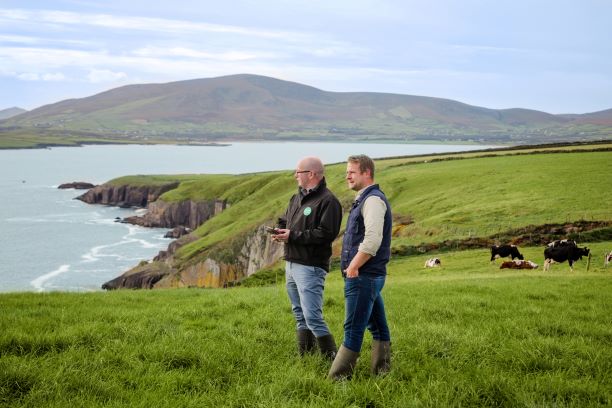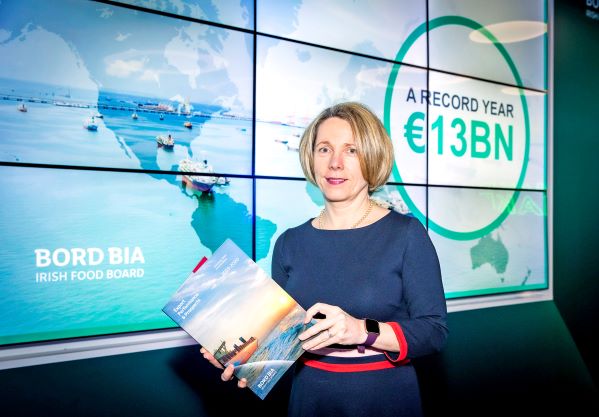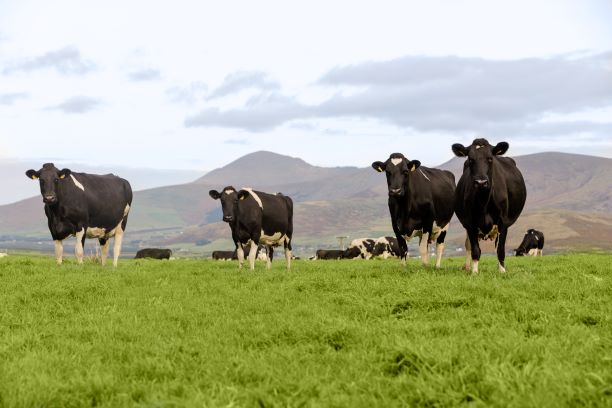CEO Tara McCarthy of the Irish Food Board discusses the organization’s response to COVID-19, food sustainability, and food industry leadership.
Boyden’s Leadership Series presents discussions with business and thought leaders from organizations across the globe. The series focuses on topical issues that offer executives, political leaders and the media insight into current trends in business and talent management in the global marketplace.
This issue features Tara McCarthy, CEO of Bord Bia - The Irish Food Board. In the interview, she discusses Ireland as a sustainability leader, managing in the Brexit era, building trust among stakeholders, leadership in the food industry, cultivating young talent, and the impact of 5G technologies including AI and robotics.
This interview was conducted in two parts, the more recent of which took place in the throes of coronavirus challenges facing global organizations, with food being a critical industry. The initial conversation took place earlier, prior to the onset of the crisis in EMEA and the Americas.
McCarthy has over 20 years’ experience in the food industry. She was previously Chief Executive for Bord Iascaigh Mhara (BIM), Ireland’s seafood development agency, and has operated in overseas markets including Germany, France and Belgium for 10 years.
McCarthy holds a Bachelor of Commerce from National University of Ireland, Galway (NUI) and an MBS in Marketing from UCD Michael Smurfit Graduate Business School, and is an affiliate of IMD in Lausanne, Switzerland. She was awarded Fellowship of the Marketing Institute of Ireland in 2018 and UCD Smurfit School Alumna of the Year in 2019.

Boyden: What has been the Irish Food Board’s approach to dealing with the challenges of the COVID-19 crisis?
McCarthy: We are working closely with the government, specifically the Department of Agriculture, Food and the Marine, the Department of Health and others, as part of the overall government response.
At the same time, internally, we’re implementing a continuity plan that will allow us to keep providing essential services, both in Ireland and through our 14 international offices. Of course part of our response is to take every precaution to protect our staff and our clients. We are doubling down on that. We see ourselves as taking the lead, in that our members are responsible for ensuring that the country’s food is safe and that it continues to be quality assured. That also means making sure that it continues to be available. There is a lot of sensitivity around both food safety and availability.
Internationally, we are adhering to the guidelines of local authorities, as well as the Department of Foreign Affairs and our embassies and consulates in each market. In places that are under quarantine, our teams are working remotely. Our international teams are also tasked with collecting local market data, looking at the changes unfolding in customer demand and consumption patterns, and adapting to that.
Boyden: What changes are being implemented in terms of process and supply chain to overcome the crisis?
McCarthy: One of the main areas where we’re making changes is our audits. They are continuing, but if a farmer, a grower or processor believes their operation may have been exposed to the virus, the audit can be postponed and their certification will be extended for 60 days. Also we are not doing any unannounced audits. For the audits that are taking place, we have developed a strict set of biosecurity guidelines for our auditors to follow.
Also, going back to the international front, we are adapting to changes in terms of logistics and supply chain issues, which we’re keeping a close eye on. We have committed ourselves to providing very up-to-date information to our producers, as much as possible, especially if they ship internationally. We want to make sure they have the right information and insights they need to make the right decisions, regardless of how fast things change and shift course. That’s a major focus.
The other important piece, which also informs our overall approach, is to respond to the changing situation in real time, as the government places restrictions on movement and on commercial activities. We are keeping our focus on our mission, and that means being agile and adapting to the situation – whether it’s cancelling a promotional event or changing the media we use to communicate. There are a lot of touchpoints.
Boyden: The Irish food and drink industry has expanded greatly in recent years, with Irish products now being sold in over 180 markets worldwide with a total export value of €13 billion in 2019. Why do you think this is and what makes the industry unique?
McCarthy: The agrifood industry is Ireland's most important indigenous industry. You could say that we haven't been blessed with huge natural resources like oil or diamonds or gas or anything like that. We've been blessed with a climate which allows us to grow grass, and that's the key ingredient of Ireland's food and drink industry.
In 2009 - 2010 there was a strategic review done of the Irish food industry. The whole globe was in a difficult place, and that was one of the big drivers of Ireland calling itself out to say ‘What is our agrifood plan?’. In 2010 it created an agrifood strategy, a 10-year plan that’s updated every five years.
This plan, Food Harvest 2020, called for the creation of a food brand for Ireland. To me that was a key impetus to the success that the industry has been enjoying. It's very hard to create a brand in the first place, but even more difficult to capture the essence of a country.
What does Ireland and its food industry stand for? When we spoke about what the food brand of Ireland actually meant to people, we asked them to try and relate it to a food or even a cuisine. The feedback was surprising. We were told it evoked images like Japanese sushi. We asked ‘Why? Why would you consider that for Ireland?’ The view was ‘it’s so natural, we could eat it raw.’ That was the fundamental insight that allowed us to build our messages around the naturalness of the food and look at the health and wellness agenda that was starting to emerge.
Boyden: How has the Irish food industry adapted to the expectations of sustainability?
McCarthy: Sustainability is the big issue today. We started to proactively work on the drive towards natural and the importance of sustainability back in 2010. We married two assets, our natural credentials and a pioneering sustainability programme called Origin Green.
What Origin Green looks to do is create proof points for customers and consumers behind the Irish food industry brand. From our perspective, when we look at our customers and consumers, it's our reputation that they're buying as much as the taste of our food products.
In a world where it's very hard to believe or trust or have sources of information that you can absolutely make decisions on, what this programme promised to do was to be an independently accredited programme that was science based, improvement led, and looked to have 100% of Irish food involved in it. Today, Origin Green is the programme we use to underpin 90% of our food and drink exports.
Boyden: Under your guidance, the Irish Food Board has helped promote the growth of Irish food and drink exports in a commercially tangible and sustainable way. What has helped guide your approach?
McCarthy: We have a unique sustainability infrastructure. There's no other country in the world doing this type of work on a national basis like Ireland.
We have 96% of our dairy farmers and 90% of our beef exports signed up to this programme. We audit their farms nationally every 18 months, and based on that audit, we carbon footprint each individual farm. We're able to then give information back to the farmer on how to improve. Today we have over 200,000 carbon footprint assessments on individual farms. We can then compare one farm to similar farms from a size perspective, a geographic perspective, etc. That data set is unique to Ireland.
In February 2020 we launched a verified grass-based system from Ireland using this infrastructure. Now we have a system that's independently accredited that allows our processors to put a verified grass-fed badge on their eligible dairy products.
Boyden: How important do you feel reputation is for organizations in the food and drink industry and what does the Irish Food Board do to build and reinforce trust with different stakeholders?
McCarthy: Everything we do is insight led, so we're looking continuously towards the market, and we're very conscious of the voracious appetite that consumers have for accredited data sets. We fundamentally believe that there's a huge connection between reputation and trust, and trust and proof points. When we communicate we always have the fantastic photos and green images of Ireland that bring our country to life but our proof is the transparency of the data.
A further significant part of our work is diving into insight at the consumer level, and translating that insight to ensure that we have the correct data sets to allow our customers to meet that consumer need. Whether that's on the move towards natural, or answers to questions like ‘How is this benefiting my health?’ or ‘How is that animal treated? What does that animal eat?’ What we're now looking to do is create the proof points to allow our customers to have that trust.

Boyden: How would you describe the growing importance of ESG in the food and drink industry and how much of the Irish Food Board’s approach is driven by these values?
McCarthy: The sustainability agenda is very sophisticated and complex. ‘Sustainability’ and ‘food sustainability’ often mean different things to different people. When consumers talk of sustainability they’re referring to their concern for the planet and perhaps will talk about greenhouse gases. When they speak of food sustainability, more often it will include their own health agenda and personal concerns. Our challenge and our opportunity are looking to interpret sustainability and food sustainability and what they mean to different people in different parts of the world.
Our research shows, for example, that the big brands are driving the sustainability agenda here in the West, but consumers are increasingly leading it in the East, and this has a huge impact on how you tell that story and to whom you tell it and how it can be carried credibly in different parts of the world.
Another driver is transparency and the appetite for information, for credible proof points. You've got different experiments going on, but consumers are demanding that you know what's going on in the food chain. A new growth platform we’ve identified is ‘mouth-watering transparency.’ This is the idea that you are more attracted to eating a product that you know more about.
A key challenge for brand owners will be to ensure that they have partners in the supply chain that can share this data with them accurately and swiftly. Ireland’s food industry, increasingly, can be that partner.
Boyden: What do you consider particularly important when looking to hire and attract new talent?
McCarthy: There isn't one perfect profile of a direct report – the fundamental ask is that they're fit for the role and for the organization, and that they have a really strong positive impact on our performance culture. We're really putting a lot of time and effort over the last two to three years into creating a distinct performance culture at Bord Bia.
Obviously when we're looking at a candidate’s profile, it's to ensure that they are a fit for our industry. The food industry has a unique set of challenges, and there's a certain resilience that's required. This as well as ambition, an innovation mindset, and ideally a clear purpose. Finally, I'm looking for somebody who can mobilize people behind their ideas, and perhaps most importantly mobilize me behind their ideas as well.
Boyden: How has your hiring technique changed over the years to promote the attractiveness and resilience of the industry and to appeal to young, future-fit talent?
McCarthy: My board in general and I personally fundamentally believe in talent. Talent is one of our organisation’s four strategic priorities badged as ‘leading through people’. The other priorities are ‘driving success and growth in the market’, a commitment to ‘insight to power growth’, and finally ‘building reputation for growth.”
Talent is called out specifically, and when I'm speaking of talent or leading through people, I'm looking at the external talent that this industry needs, and the internal talent that Bord Bia as a specific organization needs. If we as an industry are ever to compete and win, we need the best minds to support us and help us do that.
In 2012 Bord Bia, in partnership with the Smurfit Business School, designed and created a fellowship programme where we offered post graduates with two to three years' experience, regardless of sector, the opportunity to enter the Irish food industry.
Our promise to these 25 individuals was a master's [degree], at our cost, and through their project work, a 12-month exposure to potential employers in the industry. It is a win-win scenario for both industry and candidates. From an individual's perspective they had a master's, but even more importantly they had a taste of the industry, so they knew if they loved it or not. From an industry perspective, they had access and visibility to proven talent.
Today 80% of that talent stays to work in the Irish food industry. Effectively what this programme has done is allowed us to grow our own talent and attract a fantastically intelligent, ambitious group who are export-orientated to our industry. More recently we've modelled that programme to each issue we face where we may have a skills gap, including sustainability, supply chain and insight-led innovation.
Boyden: What differences do you see in terms of the management skill sets needed now versus five to 10 years ago?
McCarthy: I'm increasingly looking to develop management skills and a performance ethos that enable my management team to attract and retain the best staff onto their teams, and to play a leadership role in ensuring that the organisation embraces technology. I do think passion for our industry and hard work go a long way.
Boyden: Are there any specialized leadership skill sets that you feel are essential to thrive in the food and drink industry, and do you see a potential skills gap?
McCarthy: Where the food industry has been constantly very solid is at executing against the short-term pressures that we deal with. It has also been excellent at driving value for our customers, be that the retailers, food service operators, etc.
Where the food industry traditionally hasn't focused enough was harnessing its talent and leveraging the fantastic purpose that it holds. To me attracting and harnessing talent are the key enablers of us being able to outthink the huge challenges this industry faces. When you can attract and harness talent with a purpose, it effectively gives you access to a renewable resource that keeps you ahead of the game. We've still got a lot to learn in that space, and we continuously look at best practice from other sectors and industries.
There is this idea that the food industry is one you are bred for and you never leave it, but I think that increasingly we need to ensure that we focus on relevant partnerships and new talent sources. One example is the technology space – not only because there's a lot of technology money coming into the food industry, but because insights from data sets hold many answers for us.

Boyden: The UK is one of the most important markets for the Irish food and drink industry. How are you preparing for the fundamental change that Brexit brings to this trading partnership?
McCarthy: By gathering data, because that's all we can control, rather than get moved by the onslaught of emotions that has so often mixed up the Brexit conversation. We've been very purposefully data driven. We’ve focused on supplying our companies with relevant data. That was the motivation behind the creation of our Brexit Barometer study. It’s viewed as a risk toolkit supporting our industry’s preparation and guiding our service focus.
In this work, we interviewed all of our key exporters to the UK, be they large or small, a mushroom supplier, a beef supplier or dairy supplier. We wanted to find where they saw risks, understand if there were sector- or size-relevant nuances, and most importantly identify what we could do to help mitigate those risks.
We grouped our findings into four key areas. Firstly, customer engagement. Suppliers needed to understand their customers’ needs and explain their preparation profile. Second, risk revolves around a fundamental re-think of the supply chain, particularly as the ‘just-in-time’ model may not be possible if there are delays in the system. Third was the lack of customs and tariff skill sets for SMEs. Over the last 30 years this was a skill set that was made redundant for EU trade; however, it will have to be reintroduced to the industry. The fourth risk was directly related to the UK and the resilience of the Euro Sterling exchange rate and the impact it could have on trade.
We were able to bring this data set back to buyers in the UK and Ireland to reassure them of the sophisticated risk management profile of their supply base, as well as use this data to inform our own service offer.
Boyden: Going forward, which markets are you looking to prioritize over the next five to 10 years and which factors do you consider when identifying these?
McCarthy: We've put significant effort into helping our sectors undertake market prioritization exercises to allow us to be rather ruthless in our focus.
What we've done using data is look at our 180 markets and beyond to establish the top 30, top 15, top 10 and top five, and undertake that analysis by sector, looking at where the top five markets for beef, cheddar, dairy powders etc. are, and focusing our efforts on those markets.
In every one of those top five lists, China appears, so clearly that will be one of our core market prioritizations. Similarly the U.S. is key for certain sectors – alcohol and dairy in particular, notwithstanding current tariff challenges, and obviously the European markets maintain their important role, particularly with a defend-and-grow positioning. We're well known in those markets, but we believe there's further opportunities. Whereas in markets like China, we have a build and grow agenda because we have to build awareness, build preference, and then we have opportunities to grow.
Boyden: How do you see the potential of 5G-led technologies such as AI, robotics and driverless logistics impacting the food and drink industry over the next five to 10 years?
McCarthy: I was presenting our work at an event recently where we looked at future scenarios for our industry for the next 25 years. We explored the intersection of two key uncertainties of our future world – the adoption and influence of technology and sustainability. The resilience of our systems and industry, I believe, will be in understanding where the opportunities and challenges lie within this. Each scenario will hold benefits that Ireland can play to its strengths, but each of them as well has a challenge that Ireland will have to face.
If you look at high technology adoption rates, where consumers are prepared to share their data for the convenience of having their fridge full or having decisions made for them. What will that world mean to conventional retail? Who will the winners be? All of those decisions will have a huge impact on how our industry is structured and where it can find opportunities for future growth. But most importantly, our industry needs to reflect on where and how it will pivot to meet those challenges. We shape the future by our actions today.
Boyden: As gender equality continues to be an issue for businesswomen globally, what would your advice be to women looking to reach their potential?
McCarthy: I believe that any woman should not be afraid to invest in herself and believe in her own capability, but saying that, being absolutely honest with herself and her own performance. I mean that for talking up as well as for challenging herself on future growth opportunities.
For a woman, it's fundamental that you leverage your network and that you keep your network as broad, as wide, and as varied as possible, because the opportunities never come in straight lines. The opportunities are through having conversations, through hearing an insight, through being in the right place at the right time.
We would like to thank Francesca d’Arcangeli, Global Leader of Boyden’s Industrial Practice and a Managing Partner of Boyden United Kingdom, for making this edition of Boyden’s Leadership Series possible.
The views and opinions expressed here do not necessarily represent the views of Boyden, only those of Ms. McCarthy.
For further insight into management trends in the food & beverage sector, how companies are managing the challenges of the coronavirus, logistics, supply chain and related shifts in talent development, see the latest edition of The Boyden View.





